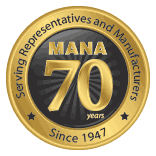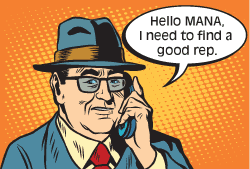 The year was 1947. Harry S. Truman was president, Chuck Yeager broke the sound barrier, and on October 17, 1947, the Manufacturers’ Agents National Association joined the community of not-for-profit trade associations.
The year was 1947. Harry S. Truman was president, Chuck Yeager broke the sound barrier, and on October 17, 1947, the Manufacturers’ Agents National Association joined the community of not-for-profit trade associations.
To celebrate our 70th MANAversary year, each Agency Sales magazine through October will include a “blast from the past” article from the early issues of The AGENT and Representative magazine, which eventually became Agency Sales.
These nostalgic looks back at how our counterparts from seven decades ago conducted their businesses and their lives are really eye-opening, in some cases because they conducted their business so differently from a modern manufacturers’ representative, and in some cases because it seems that nothing has changed in all that time. Enjoy!
Are You Looking for Good Sales Agents?
(Reprinted from November 1949 The AGENT and Representative magazine)
On a visit to Southern California, I determined to look up the secretarial office of Manufacturers’ Agents National Association to see if there might be anything new on the locating and selecting of good sales agents.
And I’m glad I did. Here are some of the things I learned.
If you, as a manufacturer or supplier, have in mind increasing your sales, through manufacturers’ agents or independent representatives, you can avoid disappointments in finding such agents, and loss of time and business in dealing with those you select, only if you go to a little trouble, spend a penny or two.
Provide for Wide Agent Choice
By all means, take the trouble to make contact with plenty of agents in the first place, to give yourself a wide range of choice. And then, take the trouble to make careful checks on the agent’s qualifications, facilities, and fundamental selling policy before choosing.
There is always “the best agent” in any city, and in any field. But you will generally find him “all sewed up,” doing a bang-up job for one of your most loathsome competitors. Usually there is no use “flirting” with him. His principals, being smart, have him under firm contract, which is as it should be.
If an agent, when he originally takes on a line or an account, is expected to introduce or pioneer and promote certain products in a certain territory, at his own time, risk and expense, he is entitled to a decent contract as soon as the principal is satisfied that he is in good hands with that agent; and, conversely, if the manufacturer is expected to lend his full cooperation and assistance to the agent in helping to accomplish that mutually profitable purpose, the manufacturer is entitled to some sensible protection against the premature loss of that agent’s future support.
Attitude Toward Sales Changing
The title, “manufacturers’ agent,” too often in the past, produced in the minds of many manufacturers the picture of a former private salesman with desk space in some builders’ exchange or wholesale center, who, chiefly by long-range correspondence, took on the representation of various products and then failed to do very well for his principals or for himself.
But I am convinced that that situation has changed considerably, and is still changing. Why am I so convinced?
For two reasons, fully confirmed by MANA, and I believe the reasons are important — and perfectly sound!
They both stem directly from manufacturers themselves.
The first is the necessity, on the part of many, many manufacturers to find a less expensive sales coverage in these post-war times of very high costs, than by training and maintaining private sales organizations of their own.
The second is the realization on the part of serious-minded and far-seeing manufacturers that when satisfactory sales agents are to be found manufacturers will exercise commonsense intelligence and have an important hand in finding them; or, if suitable available agents are lacking and have to be made, manufacturers will take a prominent and proper part in making them.
Agents or Private Salesmen?
Right away, some will say, “So, why not hire and travel our own salesmen, if we have to find agents and then assist in training them?”
The answer to that one may be found under “Business Hazards — Future.”
Simply ask yourself these questions:
“Can my product or line survive, sales-wise on its own at this time, as well as through the ups and downs of future business hazards? Or do I need to support its sales by pooling them with related, but non-competing products of other manufacturers, through the medium of well-selected manufacturers’ agents with whom I can cooperate in good times and who — in business for themselves — may be expected to lend an understanding heart and a sympathetic ear when the lean days come along?”
And then there is another point.
Every businessman has seen how governmental departments grow in size and personnel and cost of operation completely beyond the basic need and original intention, through the sheer weight of human ambition. Once launched, growth often follows the personal ambitions of the leaders and their helpers, regardless of the actual need or resultant benefits. It’s something like a mushroom in a meadow.
What every businessman will not admit is that much the same thing goes on in industry and business every day.
Just set up a sales force, start the drums to beating, fix some quotas and offer some incentives, and after a while sales (profitable or not) is pressing engineering and production for better merchandise, much, much more of it and lower prices.
That manufacturer has “started something,” which is not easy to control. There must inevitably be salary increases, larger expense items, more advertising, salesmen’s conventions, and a multitude of other things. It may mean borrowing more heavily at the bank, larger or better quarters, adding new products to balance out the line — always up and up and up — never down, and almost never on the even plane originally planned and carefully thought out.
It Depends on What You Need
Of course, it depends on what you have, and what you want.
If your product — and your project — calls for quick building of large volume, the finances for which are available, and which volume, when built, can sail the rough seas and weather the storms that are ever appearing suddenly upon the horizon, then by all means establish and build and operate your own private sales organization.
But if there is reasonable doubt on any of these important points, then it would seem very sensible — especially these days — to give more than passing consideration to the use of manufacturers’ agents.
In fact, that is exactly what scores and scores of manufacturers and producers are doing. I was quite impressed with MANA’s file with manufacturers. To me, it indicated a very important trend, a fundamental development in the direction of more stability and greater safety in selling and marketing on the part of many.
But I was also greatly impressed with another thing.
I was impressed with the impatience of manufacturers to “get a list” of agents in a certain field, or fields, their impatience to get someone to “recommend” suitable agents for their product or line, impressed with their unwillingness to spend the most reasonable time, or the most modest sums, to locate for themselves the agents they need, and to check their fitness for the territorial task to be assigned.
I am fully convinced that manufacturers approach this problem of agents much too lightly — with insufficient understanding.
Manufacturers need not be reminded that the establishment of any business takes time, careful investigation, sufficient capital, and intimate knowledge of the field involved.
But many evidently must be reminded that launching a sales effort involves exactly the same things, even though that sales effort involves the use of manufacturers’ agents.
Organizing Any Sales Effort Is Important
This is because the locating, judging and contracting with suitable agents is just as much of a job for any manufacturer as for him to select, train and launch a private selling organization — except that the capital involved is much less through agents than through private sales organizations, and usually the time involved is less if the manufacturer faces the task squarely and is willing to spend something to get the job done.
One manufacturer with whom I talked — experienced in the employment of agents — said, “Many a manufacturer seems to feel that agents should rush at him for connections upon the mere mention of the fact that he is in need of agents. But we know better than that.
“Well, then.” I said, “how do you do it?”
He was not quick to reply. Scratched his head a minute.
“You see,” he said, “we are pretty well established, agent-wise. We’ve used agents for a good many years. Maybe I’ve forgotten just how we found them.
“I could tell you better how we keep them.”
So one day I dropped into the Domestic Trade department of a prominent Chamber of Commerce.
“Manufacturers’ agents?” the man said, “Yes, we try to help manufacturers find them, but it’s a complex and often a discouraging job. We post the need, and once a month we publish the fact in our member bulletin when there is room.”
Need for Agents Should Be Advertised
He talked on, explaining some of the difficulties, reciting some of the complaints when results were not quickly forthcoming. Then he brightened, and produced a current copy of The AGENT and Representative monthly magazine, official organ of MANA.
“One of the major problems of all manufacturers is the means of locating reliable and experienced manufacturers’ agents,” he emphasized. “But here is something that should grow rapidly into a sensible solution of the problem.”
He leafed to the “Agents and Representatives Wanted” page.
“If manufacturers will advertise their agent needs, and also display their products for agents to see, then, once in touch with each other, they should be able to evaluate their interest and make their arrangements, by mail, personal interview, or otherwise, as may seem to be sensible.”
As an afterthought, he added, “Of course, we also recommend that manufacturers make use of the trade publications covering the industry involved. But the trouble there is that many a manufacturer’s activities cut across a number of fields or industries, and he must duplicate his advertising in many trade publications. The agent has the same situation, and is less likely to subscribe to all of those magazines, or to read them if he does.”
I thanked him and departed.
Then I turned my mind on what to do after a manufacturer is once in touch with a prospective agent. I had once seen an information form that a manufacturer sent to a prospective agent, and it scared him to death. “No use filling that out,” he said. “My agency wouldn’t loom large enough, to suit him.”
Select With Care but Don’t Expect Perfection
That’s the trouble with such forms. The one compiling the form doesn’t want to be accused of overlooking anything, and the result is often astounding. A simple, friendly letter is a better approach. Don’t try to rush things. Work in a request for a bank reference, and the names of perhaps the agent’s two main accounts. Ask the agent to make his own presentation. After receiving and analyzing it, perhaps another letter suggesting some additional information will bring forth what you may reasonably expect any agent to mail to you.
Meanwhile, do some private investigating of your own. You may expect that the agent will be doing the same. I won’t try to suggest what line your investigation should take, because no two situations are alike. Just don’t be in too big of a hurry. The matter is important enough to take your time.
But remember this, you may not find just the agent you want, in any case. You may have to accept some compromise, which, however, should be all right, if the agent is responsible, pliable and willing, and if you are farsighted enough to help him along with the introduction of your products into his territory.
And this, perhaps, leads to another thing.
“How can I get the best service from my agents, once I have located and appointed them?”
There is no answer to this one. It depends — depends upon many things.
Here again I looked to MANA for information, and found among some mimeographed sheets that had been handed me in a neat 9×12 envelope, as I left that busy office, one that contained the following:
Points on Dealing With Your Agents
- Appoint the best agent you can find, in each area, one you believe you can be proud of, and then give him your confidence and hearty support.
- Send all original inquiries from that territory to him, with a copy of your prompt acknowledgement to the inquirer in which your agent is mentioned by name. Your agent will often know the people, or otherwise be able to judge the potential sales value.
- Back up your agent with regional circularizing and advertising, featuring him as your on-the-spot representative.
- Keep him well and regularly informed on policy and product. Place him in position to be of advance service to his, and your, customers on all likely changes.
- Let your agent handle all misunderstandings that may arise in his territory. Customers want quick action and direct personal dealing in such matters.
- Visit your agent. Send technicians, sales specialists. Help the agent train his salesmen and customers to the uses and advantage of your products.
- Work under an easily understood but comprehensive contract, fair to each alike. Adjust differences with the agent promptly. Working together in harmony, agent and principal, will hold customers and win new ones — on a basis both can afford, profitable to all parties concerned.
MANA welcomes your comments on this article. Write to us at [email protected].



